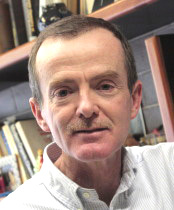Jaime Mas Oliva
Investigador Titular C
jmas@ifc.unam.mx
322 Norte
Tel. +52 (55) (5255) 56225584
Intereses de Investigación
Metabolismo de lípidos y lipoproteínas
Homeostasis del calcio celular.
Relación estructura/función en proteínas.
Péptidos como moléculas terapéuticas.
Trayectoria Profesional
Investigador Titular C
Formación Académica
Jaime Mas-Oliva is Professor of Biochemistry at the Institute of Cellular Physiology, National University of Mexico. , Ph.D. in Biochemistry (1980) from the Cardiothoracic Institute, Imperial College, University of London, Great Britain. , In 1987 and 1990 he was visiting Professor at the Gladstone Institute for Cardiovascular Research, University of California San Francisco, California, USA. ()
Ligas de Interés
Mi sitio WEB
Líneas de Investigación
Cell Calcium Homeostasis: In the history of cell development, Ca2+ homeostatic systems appeared early in evolution as a survival system maintaining a low intracellular Ca2+ concentration and therefore preventing cell damage. These homeostatic systems while generating an important concentration gradient between the interior and the exterior of the cell, constitute a key parameter maintaining cell survival in equilibrium with its ability to interact with many biological molecules and signalling function. Under these premises, we have been interested in the study of the plasma membrane Ca2+-pump or Ca2+- ATPase in both, normal cell systems as well as cell pathological conditions
Patenting: Mexican Patent Application MX-a-2012-007682. International Patent Application PCT/MX2013/000078.
Fabricación de una Vacuna Terapéutica de Aplicación Nasal contra el Desarrollo de la Aterosclerosis y el Hígado Graso.
Jaime Mas Oliva, Victor García González, Blanca Alicia Delgado Coello, Armando Pérez (inventors)
Universidad Nacional Autónoma de México (holder)
Hamol Biosolutions LLC (licensed)
Patenting: International Patent Application PCT/MX2014/00087.
Peptides derived from the C-terminal domain of CETPI as blocking molecules against cytotoxicity induced by lipopolysaccharides in septicemia and septic shock.
Jaime Mas Oliva, Victor García González, Nadia Gutiérrez Quintanar (inventors)
Universidad Nacional Autónoma de México (holder)
Patenting: Mexican Patent No. 246945. European Community Patent No. 1242446. United States of America Patent No. 7749721.
System for the Quantification of the Cholesterol Ester Transfer Protein in Biological and Synthetic Samples.
Jaime Mas Oliva and Ana Lucía Alonso (inventors)
National Autonomous University of Mexico (holder)
Hamol Biosolutions LLC (licensed)
Peptides as Therapeutic Molecules: Peptides as mediators of key biological functions show unique biochemical properties that make them particularly attractive as therapeutic agents. Peptides showing high biological activity associated with low toxicity and high specificity in general terms display little unspecific binding to molecular structures other than the desired, negligible production of active intermediate metabolites and wide application possibilities. Due to their ample chemical and structural diversity associated to their advantages in design, development and final synthesis, nowadays specific peptides have started to give positive results as therapies that in the past have only relied on traditional small chemical molecules. Following this approach, during the last few years, our group has initiated the development of a technological platform taking advantage of original knowledge generated in or laboratory studying a series of peptides in the fields of atherosclerosis and cancer. An example of this platform corresponds to several granted patents in the process of being licensed to the biotechnology industry both in Mexico and the United States
Structure / Function Relationship in Proteins: Understanding the relationship between protein structure and function remains a primary focus in structural biology with important consequences in such diverse fields as molecular biology, genetics, biochemistry, protein engineering and bioinformatics. One approach to this problem is to study how nature has reengineered proteins for new functions through evolutionary processes. This strategy has the potential to reveal fundamental characteristics of protein structures and the explicit manner in which they deliver their associated functions. Between these evolutionary processes, our laboratory has studied the capability to carry out structural transitions disorder-to-order, order-to-disorder of specific protein segments lately recognized as important in the understanding of protein function.
In an attempt to define the possibility that key folding features in proteins could provide us with the manner in which to explain basic issues such as receptor recognition, enzyme activation, lipid transfer activity, and self-exchangeability carried out by several lipid transfer proteins including a series of apolipoproteins, our group has attempted to address these phenomena by directly measuring molecular conformational changes of these molecules in solution modulated by lipids, as well as employing air/water and lipid/water interfaces
Estudiantes
 Roldán Blancas Alan Gerardo (Maestría)
Roldán Blancas Alan Gerardo (Maestría)
• Maestría(Programa de Maestría en Ciencias Bioquímicas, UNAM)
aroldan@ifc.unam.mx
Tel. 56225584
Tutor: Jaime Mas Oliva
 Calixto Tlacomulco Sandra Daniela (Doctorado)
Calixto Tlacomulco Sandra Daniela (Doctorado)
• Doctorado(Programa de Doctorado en Ciencias Biomédicas, UNAM)
scalixto@ifc.unam.mx
Tel. 56225584
Tutor: Jaime Mas Oliva
 Villa Jaimes Gloria Stephanie (Posdoctorado)
Villa Jaimes Gloria Stephanie (Posdoctorado)
• Posdoctorado(No Aplica)
stephanie@ifc.unam.mx
Tel. 25584
Tutor: Jaime Mas Oliva
 Pérez Hernández Eréndira Guadalupe (Estancia de investigación)
Pérez Hernández Eréndira Guadalupe (Estancia de investigación)
• Estancia de investigación(No Aplica)
eperezh@ifc.unam.mx
Tel. 56225584
Tutor: Jaime Mas Oliva
 Montalván Sorrosa Danaí (Estancia de investigación)
Montalván Sorrosa Danaí (Estancia de investigación)
• Estancia de investigación(No Aplica)
danai@ifc.unam.mx
Tel. 25584
Tutor: Jaime Mas Oliva

 Roldán Blancas Alan Gerardo (Maestría)
Roldán Blancas Alan Gerardo (Maestría)
 Calixto Tlacomulco Sandra Daniela (Doctorado)
Calixto Tlacomulco Sandra Daniela (Doctorado)
 Villa Jaimes Gloria Stephanie (Posdoctorado)
Villa Jaimes Gloria Stephanie (Posdoctorado)
 Pérez Hernández Eréndira Guadalupe (Estancia de investigación)
Pérez Hernández Eréndira Guadalupe (Estancia de investigación)
 Montalván Sorrosa Danaí (Estancia de investigación)
Montalván Sorrosa Danaí (Estancia de investigación)

